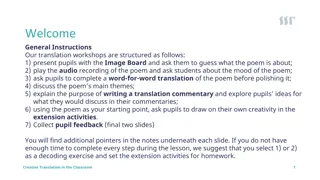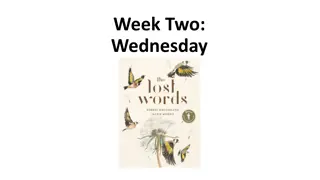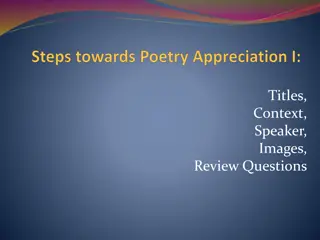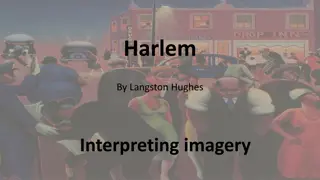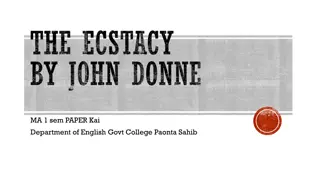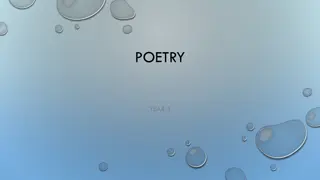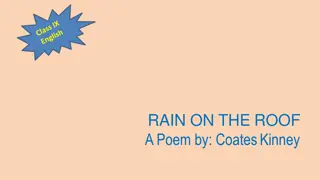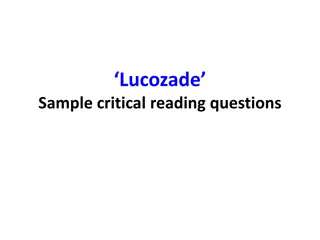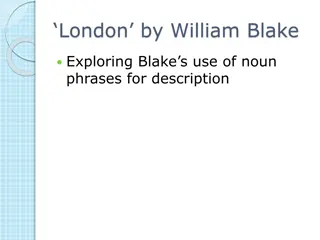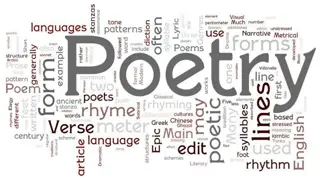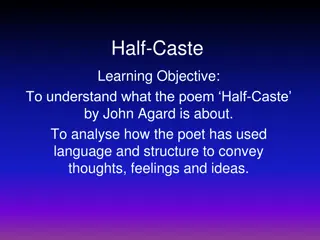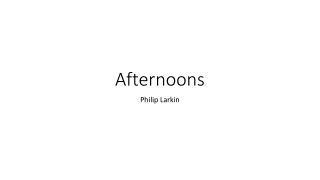Analysis of John Donne's Poem "The Sunne Rising
John Donne's poem "The Sunne Rising" humorously portrays a lover chiding the sun for interrupting his time with his beloved. The speaker asserts that love transcends time and space, elevating his relationship to a cosmic importance. Through hyperbolic assertions, Donne explores the intense subjectivity of love and the lover's perception of the world revolving around their intimate moments.
Download Presentation

Please find below an Image/Link to download the presentation.
The content on the website is provided AS IS for your information and personal use only. It may not be sold, licensed, or shared on other websites without obtaining consent from the author. Download presentation by click this link. If you encounter any issues during the download, it is possible that the publisher has removed the file from their server.
E N D
Presentation Transcript
John Donne The Sunne Rising Dr. Ankit Trivedi Assistant Professor Chhtrapati SahuJi Maharaj, Kanpur
Content Author Details Text Summary Explanation/Analysis Literary Devices
Poet: John Donne English poet John Donne (1571 or 1572 31 March 1631) was an English poet, scholar, soldier and secretary born into a recusant family, who later became a cleric in the ... Literary movement: Metaphysical poetry Genre: Satire, love poetry, elegy, sermons Occupation: Poet; priest; lawyer Subject: Love, sexuality, religion, death Metaphysical poets The Flea (poem) Death Be Not Proud Holy Sonnets
Summary: The Wife of Baths Prologue Lying in bed with his lover, the speaker chides the rising sun, calling it a busy old fool, and asking why it must bother them through windows and curtains. Love is not subject to season or to time, he says, and he admonishes the sun the Saucy pedantic wretch to go and bother late schoolboys and sour apprentices, to tell the court-huntsmen that the King will ride, and to call the country ants to their harvesting. Why should the sun think that his beams are strong? The speaker says that he could eclipse them simply by closing his eyes, except that he does not want to lose sight of his beloved for even an instant. He asks the sun if the sun s eyes have not been blinded by his lover s eyes to tell him by late tomorrow whether the treasures of India are in the same place they occupied yesterday or if they are now in bed with the speaker. He says that if the sun asks about the kings he shined on yesterday, he will learn that they all lie in bed with the speaker. The Curious Case of Benjamin Button The speaker explains this claim by saying that his beloved is like every country in the world, and he is like every king; nothing else is real. Princes simply play at having countries; compared to what he has, all honor is mimicry and all wealth is alchemy. The sun, the speaker says, is half as happy as he and his lover are, for the fact that the world is contracted into their bed makes the sun s job much easier in its old age, it desires ease, and now all it has to do is shine on their bed and it shines on the whole world. This bed thy centre is, the speaker tells the sun, these walls, thy sphere.
Analysis One of Donne s most charming and successful metaphysical love poems, The Sun Rising is built around a few hyperbolic assertions first, that the sun is conscious and has the watchful personality of an old busybody; second, that love, as the speaker puts it, no season knows, nor clime, / Nor hours, days, months, which are the rags of time ; third, that the speaker s love affair is so important to the universe that kings and princes simply copy it, that the world is literally contained within their bedroom. Of course, each of these assertions simply describes figuratively a state of feeling to the wakeful lover, the rising sun does seem like an intruder, irrelevant to the operations of love; to the man in love, the bedroom can seem to enclose all the matters in the world. The inspiration of this poem is to pretend that each of these subjective states of feeling is an objective truth.
Literary Devices Used Symbols .Angels Angels symbolize the almost-divine status attained by beloveds in Donne s love poetry. As divine messengers, angels mediate between God and humans, helping humans become closer to the divine. The speaker compares his beloved to an angel in Elegy 19. To His Mistress Going to Bed. Here, the beloved, as well as his love for her, brings the speaker closer to God because with her, he attains paradise on earth. According to Ptolemaic astronomy, angels governed the spheres, which rotated around the earth, or the center of the universe. In Air and Angels (1633), the speaker draws on Ptolemaic concepts to compare his beloved to the aerial form assumed by angels when they appear to humans. Her love governs him, much as angels govern spheres. At the end of the poem, the speaker notes that a slight difference exists between the love a woman feels and the love a man feels, a difference comparable to that between ordinary air and the airy aerial form assumed by angels. SN Plus Summer Reading The Compass Perhaps the most famous conceit in all of metaphysical poetry, the compass symbolizes the relationship between lovers: two separate but joined bodies. The symbol of the compass is another instance of Donne s using the language of voyage and conquest to describe relationships between and feelings of those in love. Compasses help sailors navigate the sea, and, metaphorically, they help lovers stay linked across physical distances or absences. In A Valediction: Forbidding Mourning, the speaker compares his soul and the soul of his beloved to a so-called twin compass. Also known as a draftsman s compass, a twin compass has two legs, one that stays fixed and one that moves. In the poem, the speaker becomes the movable leg, while his beloved becomes the fixed leg. According to the poem, the jointure between them, and the steadiness of the beloved, allows the speaker to trace a perfect circle while he is apart from her. Although the speaker can only trace this circle when the two legs of the compass are separated, the compass can eventually be closed up, and the two legs pressed together again, after the circle has been traced. Blood Generally blood symbolizes life, and Donne uses blood to symbolize different experiences in life, from erotic passion to religious devotion. In The Flea (1633), a flea crawls over a pair of would-be lovers, biting and drawing blood from both. As the speaker imagines it, the blood of the pair has become intermingled, and thus the two should become sexually involved, since they are already married in the body of the flea. Throughout the Holy Sonnets, blood symbolizes passionate dedication to God and Christ. According to Christian belief, Christ lost blood on the cross and died so that humankind might be pardoned and saved. Begging for guidance, the speaker in Holy Sonnet 7 (1633) asks Christ to teach him to be penitent, such that he will be made worthy of Christ s blood. Donne s religious poetry also underscores the Christian relationship between violence, or bloodshed, and purity. For instance, the speaker of Holy Sonnet 9 (1633) pleads that Christ s blood might wash away the memory of his sin and render him pure again. Taken from Open sources Note:





